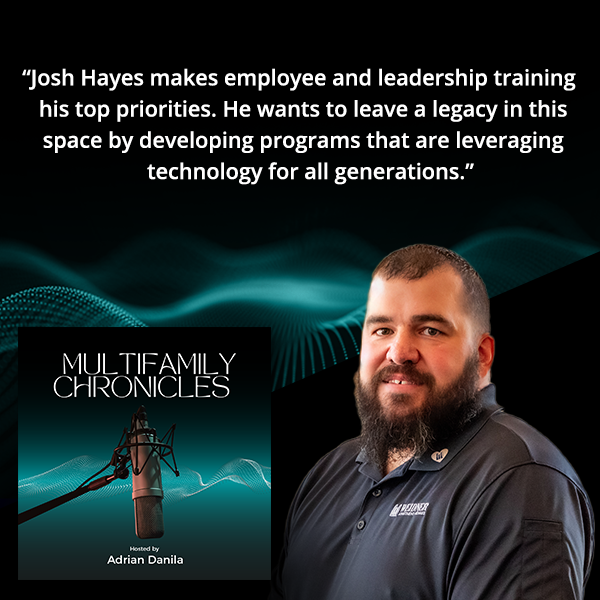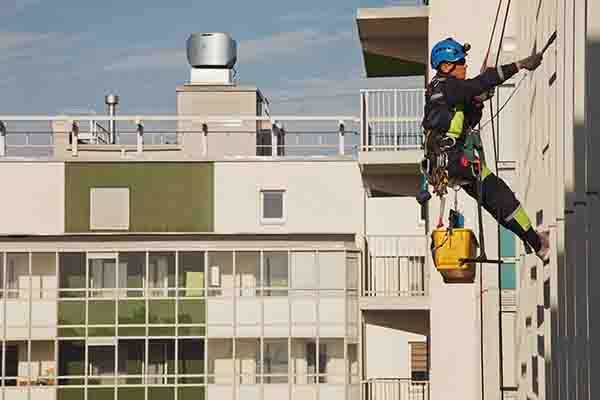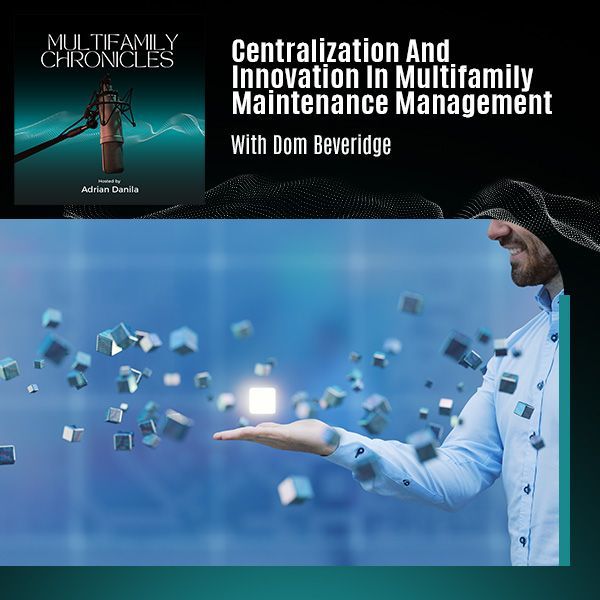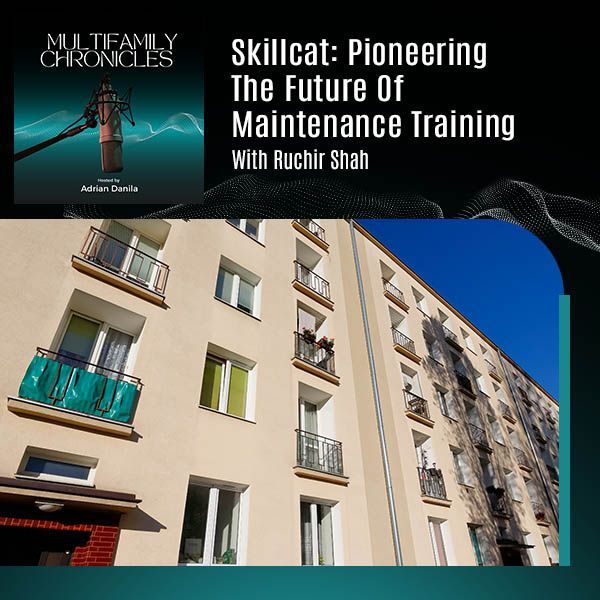Building a Strong Maintenance Culture in Multifamily With Josh Hayes
One of the departments that keep multifamily properties up and running is the maintenance field. Since they are responsible in maintaining everything in order, the right leadership approach and culture must be implemented here. Joining Adrian Danila is Josh Hayes, the Maintenance Regional Service Director with Weidner Apartment Homes. He shares how they address the Great Resignation, employee burnout, and competitive pay. Josh also discusses the importance of effective training programs, the need of certification for service managers, and the best approach in delivering incentives to boost staff performance.
---
Watch the episode here
Listen to the podcast here
Building a Strong Maintenance Culture in Multifamily With Josh Hayes
This is episode number 42. I have right here with me my guest, Josh Hayes. Josh is the Regional Maintenance Director with Weidner Apartment Homes. Welcome to the show, Josh. Let's start by introducing yourself to the audience first. Tell us a little bit about yourself, your personal and professional background.
My name is Josh Hayes. I'm living in Oklahoma. I’ve been married for several years, and got a wife with 3 kids, 2 daughters, and a son. My daughters played club volleyball, so that consumes a bunch of my life starting now until about May. That's why I work pretty much. I've been in the industry since 2004. I started as a groundskeeper in Colorado Springs and went up from there. I had a family friend that got me into the business.
I was a groundskeeper for about 3 or 4 months and showed my service leader that I wanted to advance. I wanted to learn more, so they took me under their wing, and worked with them for about three years. I consider him my mentor. I base a lot of my leadership styles around him. I've never asked any of my guys to do something that I won't do because he did the same thing. He was side by side working with us.
Most of my industry experience has been in Colorado. I worked with Riverstone, opening up some new builds with them. I spent about twenty months in Williston, North Dakota, so that was quite a shock. Our executive vice president asked me to go up there, so when he asked you to go, you feel obligated to go, but it was a great experience. Halfway through that, Riverstone got bought out by Greystar and had some leadership changes. That same vice president asked me to come down to Oklahoma City to work with his company that he was working with then doing construction management. I did that doing renovations, large CapEx projects, and whatnot.
I essentially worked myself out of the job because we ran out of properties, and I wasn't going to relocate again. My wife and I have moved about eighteen times prior to buying our house, so we were set in our ways. My daughter had her friends, so Oklahoma City was home now. We let go. About two weeks into being out of a job, I got a phone call from a rep that I didn't even do work with.

I spoke with him briefly about doing renovations, and he asked me if I wanted to get back into the management side. He said one of his community directors had a property that was coming up their company was getting ready to buy. It was a large asset, and I was like, “Sure. Put my name in the hat,” and got a call and been with Weidner ever since.
I was going on with Weidner, managing Brookwood Village Apartments, which is the largest in our portfolio. It's 1,128 units, over 68 acres, have a large staff, and we did well there for the four and a half years I was there. We turned it around, made it a great property, and it's still thriving. I’m the last man I got promoted to Regional Maintenance Director, so now I'm over Oklahoma and Arkansas.
You have had a remarkable career so far, and I'm sure the best is just to come for you. A lot of the maintenance professionals in multifamily are frustrated by the fact that there are not many opportunities out there to move up the ladder. Opportunities exist. That's the reality. This is how you got into the role that you are in now. This is how I've gotten into the roles that I had within the multifamily industry. I wanted to ask you. What drives you?
As cheesy as a sound, it is my family. I do everything for them. I'm a selfless man. I have a nice truck. I got a nice house, but what do I do with my kids? I want them to have a life. I had a great life growing up. it wasn't the best. I didn't have everything. I didn't have Nike shoes all the time and stuff like that, so I wanted to provide for my kids something that I didn't have. What ultimately drives me is my family.
Family is everything because you only get to have one. When it comes to jobs, you might have 2, 3, 5, or 20. I don't think it's cheesy. It's very important. What advice would you have for someone that's currently working at the site level, no matter what position? It could be a groundskeeper or service manager. What advice would you have for them if their goal is ultimately to move up the ladder and become a regional service manager like you?
Take risks. North Dakota was a huge risk for me, moving from my family, from Colorado to someplace where I've had no family. That gave me a lot of experience. Be willing to take that risk. Take bets on yourself. Not every opportunity is going to be the best opportunity, but it's something that you're going to learn from. Don't be afraid to ask for help along the way, especially the entry-level guys, the 2 to 3-year service techs, the groundskeepers, and whatnot.
Men have issues with asking for help. Don't be afraid to ask for help and ask for guidance to get through things because we don't know everything, and that's how we're going to get better at it. Don't be afraid to fail. If you make that mistake, as long as you learn from what you've failed on, then that's going to make you better in the long run field.
Tell me about some great things that are happening at Weidner currently.
2023 is going to be the year of Weidner Field. Mr. Weidner realized in 2021 that things got away from what his overall goal, vision, mission, and value is, and what our vision, mission, and value is. We took a step back, reevaluated the company, made some changes, and those changes are starting to go back this 2023. We've had a couple of changes happen now, but 2023 is going to be the year of all those changes.
Last November 2021, we had our first town hall meeting. Mr. Weidner got the computer, got on the recording, and he vowed that within four years, Weidner was going to be one of the best companies to work for both company culture-wise, pay-wise, and things like that. He ended that conversation by giving everybody a pay raise throughout the entire company that day when in effect that current pay period.
The previous year for COVID, he came out and sent a letter, giving everybody a $2,400 bonus for Christmas. In 2022, we had a handful of committees that got created to see what we needed to change, where we get away from our company culture and our people, and how we get back to that. Those committees have all wrapped up, and now we're rolling out those committees, and we're trying to figure out how we roll them out.
We had another town hall meeting, and that was the first step for the rollout. Once again, at the end of that town hall meeting, he gave every single Weidner employee a pay raise at that point in time. Not to mention, we give company pay raises in the first quarter of every year as well too. We give evaluations and pay raises after that. Not only did we get our pay raises in May, but then we got a pay raise last time as well. We got another great email that got submitted from one of those committees, and that's our on-call program. They realized that needed to be changed up. That got changed up.
Everything got implemented. Now going forward, we have a completely different on-call program. I just received an email. They're going to be rolling out a new bonus program for us. They’re restructuring our bonus program because it hasn't been changed since about 2013. Increasing the bonus for onsite team members, changing the way we're doing it, and stuff, are the first three parts of our committees that have.
We still have about 4 or 5 more committees that are going to be rolling out changes to the company. I'm truly excited about Weidner as a whole in 2023. Oklahoma City, Oklahoma region is one of our fastest growing markets. It's where Mr. Weidner is investing in. Oklahoma City, Oklahoma, Tulsa, and Arkansas are places to be if you want to have a good career with Weidner.
I'll be on the lookout for more updates from your company. It sounds like a lot of exciting stuff is about to happen right there. It's great, and I encourage everybody that's reading to keep an eye on your company, especially if they live in those areas. This brings me to my next question, Josh. My next question is, could you tell us about the coverage that your company has as far as geographical coverage? What states are you in currently?
We're number 14 or 15 on the national list for ownership size. We have, with our acquisition, about 302 properties. We're based in Kirkland, Seattle. Seattle has about 50 to 54 properties there. We're based in Anchorage, Alaska, so we have a huge presence in Anchorage. We're across Canada and four different Providences. We have about 52 properties there and properties in North Dakota. We're in Minnesota and Wisconsin. We're growing in Minnesota as well.
We have about 22 properties in Minnesota, about 15 properties in Wisconsin, and 16 properties in Colorado Springs, Colorado, and we're getting ready to break ground on a 900-unit build around Weidner Field in Colorado Spring. Our largest footprint is in Phoenix, Arizona, where we have about 9,800 units at about 46 properties. We have properties in Midland-Odessa, DFW. Between the 2 cities there, we have about 9,000 units. In Oklahoma and Arkansas, we have 25 properties with about 8,800 units.
That’s pretty impressive as far as numbers overall and also footprint. Any plans to come to the Southeast?
It's been talked about. Ohio and North Carolina have been mentioned on that list. The crazy thing was in 2020 DFW was not even on our radar to be in the Dallas market. In June 2021, we bought our first property, and now we have 14 there, and we're getting ready to close on 15 next month. It can change at the drop of a hat, and we could be in that market this time in 2023. You never know. Mr. Weidner has a great team around him to see where the best markets are. If that market is a smart market to get into, then we'll jump into that market.
That's excellent news. I'll follow your company and I will be excited to see the growth that you are experiencing. The next topic I want to talk to you about is labor shortages in maintenance in particular. Our industry has been known as an industry with high turnover rates, especially on the maintenance side. COVID came in. COVID hit, and the rates went through the roof. We're hurting way more than ever before. How do you think we got to this point, and where do we go from here? What solutions do we find to alleviate this pain that we have with not being able to find enough qualified maintenance personnel?
It might seem like a funny answer, but with COVID being that starter point, social media like TikTok got us there as well. I can't scroll through my TikTok without seeing people saying, “Here's how you start an LLC. Here's how you get into the power washing business. Here's how you do this.” With that, COVID companies started to either lay off people or hours drastically, so service guys had to find a way to supplement their income.
We naturally are gifted. We have the ability to paint, build things, fix things, and stuff like that. A lot of our industry guys did was probably look in their neighborhood on their Facebook page, if there's word of mouth for repairs and project people want to get done around the house. With everybody doing a lot of work from home stuff, they either need an office space built or designed. They got to have somebody do that. They might find a local handyman to do that. They're sitting at home, working from home, and were like, “I can use any paint job.” They're going to find somebody to do that. We're talented to where we can do that.

Projects like that from homeowners start to drive people to start working with their hands more to supplement that income. Word of mouth or their skillset kept letting them grow. They got to the point where they go, “I can build a deck and make $2,000 in a weekend, so why should I work 40 hours a week? I can control my hours.”
That led to at least a Great Resignation on the maintenance side of TikTok and social media with COVID being the pusher on that and guys finding handyman jobs. As far as time to stop, it seems like a simple answer, but we have to take care of our people. We have to recognize what they're doing and providing for us. We have to make sure that we're giving them ample free time and time to spend with their families.
We're paying them. Pay is a driving factor nowadays. I look at it and I have texts that complain about what they're making as a tech, and I'm like, “I was a small family making $11 an hour as a service guy back in ’05 and ‘06. You guys are complaining about making X an hour. I would love to make that then,” but it's a different time. Being competitive with our wages is going to be that big thing as well too.
We're trying to attract people from outside the industry. Especially, the younger generation that has never been in the workforce. They're about to step into the work. What advice would you have for a young person that might consider a career in the maintenance field?
I would've explained the benefits of multifamily. We're not going anywhere. It's never going to go away because you're always going to have people. You have the Boomer generation that they're getting out of their house, and now they have to get into an apartment potentially because they don't want to live in assisted living or a nursing home.
Multifamily is not going anywhere. The boomer generation is going out of their houses and getting into apartments to avoid living in nursing homes.
They got to live in an apartment because they still want to be free. You then have the younger generation that's come up that they don't want to buy a house. Buying a house is not the American Dream anymore, so they either want to rent an apartment, whether it be something new downtown or whatever. When I am interviewing people, I'm speaking on behalf of what I've experienced and from my growth career. I let them know what’s available for them. Let them know that multifamily is not going anywhere, and we can have an interest rate hike, and these trade jobs might start slowing down or you already know your work shift.
You're going to work Monday through Friday, 8:00 to 5:00 on call once every 3 or 4 weeks. Whereas if you go be a plumber or an HVAC technician, in Oklahoma City, May to September, you're doing 80 hours a week. What are you doing from September to May essentially? You might be getting 20, 30 hours a week and whatnot of that. It's talking to them and then letting them know the consistency of multifamily.
Can you think of a few great ways to attract people to the industry, towards our companies, and through your company? Would you like to share them with the audience? What has been working well for you?
For us, a word of mouth has been phenomenal, especially here in Oklahoma City. I look at a lot of resumes on our job site when they come through. It's not only from the recommendations from our current employees but people that have never worked for our company. They have friends. They have former coworkers that have worked with us and referring them.
I've seen a handful of resumes that came through from some leasing agent who doesn't even work for Weidner but has friends that work for us and hear about how well we're doing stuff. She's referring people to Weidner versus her company. That word of mouth and the way you take care of your employees is huge. The apartment industry, while it's big, is a small community within every city. It's the apartment association and everybody starts talking when you go to these events. It's the word of mouth and taking care of your residents or your employees.
Word of mouth and taking care of your employees are necessary to achieve success in the apartment industry.
Also, go to these trade schools and maybe try to talk to them and have them some program where you can bring them in and teach them the maintenance side of it. Weidner has an SIT program where we go down in Texas. We're trying to talk to some of their HVAC guys and saying, “Here's why you should come to join the Weidner. Here's why you should be on the apartment maintenance side versus going into doing HVAC.” We've had great success with that in the past, and we continue to have great success with that.
It's fascinating. Those are some great ways to attract people, but you can't be that efficient unless you have something to offer that is something meaningful. I'm not necessarily talking about salary, benefits, and perks but the environment. This brings me to the next topic, which is company culture. Company culture is something that I'm very passionate about. I speak and write about it on social media, on LinkedIn mainly. I want to get your take on company culture. What are the things that matter to you when it comes to company culture?
Growth opportunities and being able to be heard. I've started that new little hashtag #NoPizzaPartiesHere. Especially when it comes to the service side, that's one of the biggest things that I see posted. The launches aren't going to keep your guys around. It's trying to find out what makes the guys happy and what recognition they like if they need any.
Some guys need a pat on the back once every other few weeks or whatever. We've gotten creative with, if you're doing an excellent job, “Maybe on Friday you're taking a half day off, and we're going to pay you for it.” If you have a good productive week that week, then go ahead and start your weekend early. For us as well too, it amazes me when I look at our LinkedIn profiles for Weidner, and I see the time in that we're celebrating some of our employees.
We got one earlier this 2022. We have a housekeeper that's been with us for 25 years. I was blown away. As a housekeeper for 25 years, I go, “I would probably venture to guess that we have more people that's worked for Weidner over 10 years than what we have less than 10 years.” It all comes from our leadership too.
For us, for example, we have such great tangible evidence of that company culture. We have growth in our region. We have an MIT program, which is like the SIT program, but it's for Managers In Training. Our executive vice president was the very first MIT several years ago. She went through the program. She was up in Seattle. She moved to Arizona.
She became an area director there. She moved to California. She became an area director and a regional director there. She then moved to Oklahoma and was a regional director over Oklahoma in California. In 2021, she got promoted to Executive Vice President over Oklahoma, Dallas-Fort Worth, Arkansas, and Midland-Odessa. We have that growth that we can show in our company.
Our regional director now was an MIT several years ago in Arizona, so she's come up through the program as well. Our other area director here in Oklahoma City was an MIT several years ago. He started at nothing, just coming into the business straight out of college, and here he is years later as an area director over six of our assets.
On the maintenance side, we have our SIT program, and we promoted our first SIT. She was our second SIT in Oklahoma. She got promoted in 2022 after a few years to one of our downtown portfolios as a service leader down there. That's one of the things that when I'm talking to employees or potential employees and even employees, I say, “Look at the tangible evidence that we have on the growth that you have within the company.”
One of the things that you touched on previously was pay. Let's talk about competitive pay. I don't mean a number. I don't want you to say, “Competitive pay is going to be $25 an hour or $13 an hour,” or whatever the number might be. We both know, and the audience also knows that this varies based on the market, based on the age of the property, based on many things, the size of the property, and the difficulty of that particular job. How do you determine competitive pay? What are some factors that help your company determine what competitive pay is?
We stepped out of looking at the apartment industry. We started asking when we would interview somebody, offer them a job, and then call, and maybe say, “We want to offer you this job.” They say, “Unfortunately, I took this job somewhere else.” We would ask them, “Where? Why?” Amazon was a big factor for us. We lost a handful of service team members to Amazon because you can go to Amazon and make a dollar more than what we were offering. No on-call, no responsibilities. You clock in, clock out, go home, and you're done.
From what I understand, it's not the best job, but we started to look outside. We started using Amazon as a gauge for us. Because of that, we upped our pay to be either equal to or more than what Amazon is paying. It's looking outside of not just our department industry, but who else are we losing employees, whether it be current employees or prospective employees.
Who are we losing those two? We need to ask them and be willing to ask them those questions. “What are they offering you to pay?” You can even go to 7-Eleven and make $16 an hour as a clerk. We're paying our groundskeepers $15 an hour to start roughly, so they can go there and have no responsibility. If they don't have any growth, now we got to re-evaluate our pay for that and take that into consideration as well too. It's looking outside of the box out of the apartment industry as a whole and utilizing other companies and what they're paying.

I love the fact that you guys have those visions to see the big picture to see and acknowledge the fact that you're competing not just with a company down the street from you, but you're competing with everybody in that market. Every single business that is hiring, you are competing with them. That is the world we're living in.
What we've learned from that is instead of reevaluating our pay once every two years or once a year, now we're reevaluating our pay multiple times a year. Every quarter, we're pulling reports. We went through one time and gave a blanket pay raise to everybody to get them up to what we feel the new market is.
A percentage of our employees got a pay raise because the market was falling for it. They didn't ask for it. They weren't complaining about what they were making. They were happy with what they were making. We come along and say, “Here's this, sign this, and you're getting a pay raise because of the market around us.” That's one of the great things about Weidner. Like you said, we're looking outside the companies that we're losing people, but then we're also doing something about it multiple times throughout the year.
You are one of the very few companies that I'm learning that does that in a current environment. You're in for huge or tremendous wins in the present and the near future. The best way to attract the best talent is to be the first company to lead the way, and it seems like your company is that type of company. Everything that I heard from you that you shared with us here with the audience has been amazing. You're in for some big wins. Keep it up. If you are going to keep it up, everybody else is going to try to play catch up. That's for sure.
Here's the next topic. I wanted to talk a little bit about the on-call. This is one of the tough complaints when it comes to maintenance, onsite maintenance. They're complaining about on-call. “What does on-call cover? What do they have to cover during the on-call, the hours, the pay, the comp company?” It's a whole conversation. Talk to me about how your company approaches on-call. What are the expectations? Also, what is the compensation for someone being on call?
That's a big trigger button for me. I left the company because of the on-call. I had a community director that she tried to throw her own comp time and, “Be thankful you have a job.” I started looking and left. For me, on-call is a huge thing. In my opinion, if your company wants to offer 24-hour, 7-day, 365 days a week a year on-call, you want to pay for those calls.
If you're not willing to pay for them, drop the service and see what it does. See where your occupancy goes, what type of clientele you get in there, what type of people you attract, and how your asset goes. I know you posed this question. You put in a poll, and I answered that with, “This is a great answer, and I felt that we were leading the industry.” I saw some of the responses. I was like, “Maybe we're not.” I screenshotted those comments and sent those off to my regional director and my executive vice president and said, “Weidner is not where we're supposed to be at. Here's what other people are doing.”

We used to offer $10 a day for being on call. Take the phone, and it's $10 a day. We would pay out all your calls. We will never ask you to go off, take off earlier, or anything else like that. We increased our stipend to $25 a day. Every day you're on call, it's $25 a day. If you are on call for a holiday, it's $50 for that one. Not to mention, we're still going to offer and get paid for all your hours. In my opinion, if you're getting a lot of hours of the long call, either you work at a hard property or there are a lot of issues with that property that need to get fixed.
If you have 8 to 12 hours of long calls, and now you're getting asked to cut eight of those hours, you now are off on Friday. All you're doing is putting your property back behind. I've never quite understood why somebody would ask you to cut on call when all it's going to do is it's going to put your maintenance team in a bind.
I saw that a lot when I was in Colorado because we had to shovel snow at 5:00, and I was on a large property, so we would shovel snow from 5:00 in the morning to 3:00 in the afternoon. We might have to do that 2 or 3 times a week. Our property manager was like, “You guys need to go home because we're not paying overtime.” I was like, “We spent eight hours doing snow removal. What do you think we got accomplished today? No work orders got done.”
The next day, we're still tired and trying to recover, so we're not 100%. Doing half is what we're doing. Come Friday, we're now fully recovered and ready to work, but now we have to take the day off, and we're staffed again. For me, if you want to offer it on-call, then you better be willing to pay for it. That's a great thing for Weidner’s. It's approved over time for every associate and stuff. That's going to be a big deal breaker for us. What's going to separate us and make us industry leaders in each of our markets is by having that stipend.
I sent an email to our recruiting department and told her, “I want to let you know about the on-call change.” We have 2 or 3 open spots in Oklahoma City, and I said, “When we're talking to people, you make sure that you say that because it is something. It is a trigger point for some people.” I spoke to one of my service leaders because I'm working around trying to build teams, geographically speaking. That way, instead of having 3 guys on call, maybe he has 6 guys in rotation. I called one of my properties and talked to the service leader and asked him about it.
He goes, “Ever since that email came out and everybody's stipend increased, now everybody wants to take on call, and they don't want to share it now. They would rather get paid that extra money.” It made that change. To go from being the biggest, negative thing about the job being on call, now it's, “Give me the extra money. I'll take the extra hours. I'll take the $100 a week extra of what it was before.” It's definitely been a huge change for us. Like I said, that might have made us the industry leader with that stipend.
It's pretty amazing the change that you notice once you start paying people to do the work, compensating them, and it goes beyond the lip service type of deal saying, “We care about our people.” Once you start putting the money where your mouth is, amazingly, how many things can change and do change? Again, I had to applaud you and your company.
I'm extremely impressed. It's probably the best program and the best experience that I have had talking to someone in the industry in recent years. You're in for some amazing wins. Keep pushing it because everybody else is going to play catch up with you. They're going to have to work hard to compete with you and over the talent too. I don't mean a different competition that has more properties. At the end of the day, it comes down to people who have the best-qualified people because that's where the fight is. That's where the recipe for success is, in my opinion.
Everybody that's a large company that has 10, 20, 30, or 60,000 units has a lot of money to invest. Money, technology, and resources are out there. It’s how you get the best talent. It seems like your company found some great ways. I'm amazed that I haven't seen anything. My personal suggestion would be to do more advertising for what you're offering. Honestly, if it wasn't for this conversation, I would've known about so many great things or amazing things that your company does. You should be using that. You should aggressively market those benefits because they're top of the industry, I promise you that.
The next topic that I have is burnout. Burnout is something that's causing a lot of maintenance professionals to leave the industry altogether because they've been burned out, overworked, underappreciated, and they're done. Tell me about a few ways that you can think of to help the teams not to feel this burnout.
I would start with what I call nickel and diamond yourself. When we offer the vacation, we offer the same time and stuff. In the four and a half years when I was at Brookwood, I saw a lot where, we might have had a busy Monday, Tuesday, so somebody's going to call in on Wednesday. “I don't feel good. I'm just tired and don't want to come in.”
What ends up happening from what my experience is, whether it's people that are new to apartments or new to having benefits, they tend to take, “I get paid to have this day off. I can sit at home and do this.” I've always told my guys, “If you're tired or burned out, take a week off. Try and take off 4 or 5 days of recharge. Don't take a day off here and there because what are you truly getting from it? If you truly want to get that recovery, take off Thursday, Friday, Monday, and Tuesday.” It gives you six days to recover. Don't do something.
Stop short-changing yourself. Stop taking this day off here because you wake up, and you're like, “I don't want to shower. I don’t want to get dressed. I'm going to lay here in bed for the next two hours.” You’re going to work the next day, and now you're behind on that day that you missed already, and that's how you feel. I also think you need to have support systems there.
Weidner believes that when you get hired on, you don't get hired on for a property. You get hired on for a Weidner. We have that support system with our company from assistance from other properties. One of the things that we rolled out as well is regional floaters. Here in Oklahoma, we added a regional floater to our Tulsa market.
We added one to our Oklahoma City market so that their main goal is to cover vacations. That's the way I'm telling all my service leaders, “He is here to help you cover vacations, so now let's push you guys to take a week off. Let's push you to take multiple days off because we have the resources for somebody to step in, fill their shoes, and now you're not going to get behind.”
The same goes for service leaders. He was one of my service techs. He is in that spot now where he can jump in and manage a property if we give him one if he wanted one instead. I told all my service leaders, “You can take a week off because you have Kenneth coming in to help you. He knows how to schedule vendors, how to pull work orders, close out work orders, and manage teams. You can go on vacation. You can leave and know the property's not going to fall. It's not going to fail.”
An issue that I experienced myself is when I was on vacation, I was consistently worried about what was going on. Fortunately, for me, I saw something in one of my techs. I took him under my wing, I mentored him. Spent about two years training him to take my spot because I knew I couldn't get promoted unless I had somebody to fill my shoes with because it was such a large property. I brought him along on my journey and trained him up with Weidner, showed him how to use Yardi Budget, hire people, and stuff like that.
When I wanted to go on vacation to prevent my burnout, he would run the property. I know when I came back, everything was running smoothly. One stop short of changing yourself and taking a day off here and there. Let's go ahead and take a week off at a time, 4 or 5 days off at a time but then companies need to try and have some regional support team for you. You can say, “Take some time off because we have somebody coming in to help you out.”
That's one of the things that I've been predicting for a very long time. I was able to apply the same system, to hire a team of floors to support my properties at a time, a few years back, and the results were amazing. We're able to maintain the properties, the very high, standard levels of service. He helped with everything. It reduced employee turnover. It reduced stress levels. Again, another thumbs up right there for doing that. That's amazing. I wanted to ask you about your onboarding system for me as a professional. Could you walk me through how you onboard new personnel?
All of our onboarding goes through our regional admin. We have one single person for each region, and they're in charge of that onboarding process. From the hiring process, we post jobs on Indeed or LinkedIn. We have our recruiting department. They'll reach out to the prospective employees, and ask them some basic questions. Make sure they're going to be a good fit for us, or they're qualified, they have a license, insurance, whatever it is for qualifications.
They'll pass it along to us, we'll interview them on-site, make the decision, and then when it comes to onboarding, we have the same person that onboards every single associate. We hired an associate. It was the middle of October. He was supposed to go work for another company in Arkansas. He had everything lined up. He had his date for his onboarding. He goes to show up at the property. Nobody knows who he is, and he's supposed to be working at this property.
The property manager doesn't know anything about it. The person that was doing the onboarding never passed along any information, never did anything. He's standing there, “I don't know what to do.” He left and came on with us. The community director for that property reached out to him and said, “I want to make sure you're ready to go. We're going to be here at this time, on this date for your onboarding,” so there's nothing verbal. We let him in.
We did it virtually because he was in Arkansas, and our regional admin was in Oklahoma City. We sat down, did the onboarding process, and it's important because they go through so much information in the first eight hours of the start. They got to know if they got their benefits, their tax deductions, their direct deposits, and all the benefits. All that needs to be conveyed and it needs to be conveyed in a consistent manner.
I feel if you have property managers doing it, then it could change drastically from property to property, and you might miss out on something huge for it. The onboarding for us is pretty spot on with having our regional admin take care of it. They spend the first day watching some basic videos, fair housing, sexual harassment, and things like that. For the first day and a half, that's what they do. They have another 90 days to finish the rest of their video training.
Training is an important piece of our business or it should be at least. Especially for maintenance professionals, things change. New technologies are coming along, and new ways of fixing things are coming along. Tools out there. We have to keep up with what's happening in the world. Tell me about how you envision the ideal training for maintenance in 2022 and 2023. What would be the most efficient and meaningful way of training maintenance professionals?
Training is very important for me. That's where I've put my hat on, where I want to leave my legacy behind. That's something that I want to do. When I leave this industry, I want to have somebody can look back to and say, “Josh, started this program for training and stuff.” We need to look at common technology based. It's computer-based. It's app-based as far as Yardi mobile and stuff like that.
I've seen the resistance from the older generation not wanting to do work on a computer. They're not wanting to learn much about Yardi and stuff, but explain to them the benefits for them and how well it comes into play, which helps them in the long run. The training for me is something that's important. Even for us as a company, we have our two training programs for a manager in training and service in training. We can bring somebody in with little and no experience on the maintenance side, spend some time with them, and at least get them the basics.
The older generation resists working on computers. Younger people must explain the benefits they can get from using such equipment in the long run.
What they're doing is they're on the hip of a certified mentor for the time of their training, and they go through pretty much everything you need to know about the department industry. They don't master everything, but it gets to the point where they can understand and see things from a different light. That's been a great successful program for us as a company as well too.
The next topic that I want to talk to you about is National Apartment Association certifications. You're involved with the programs. You have some designations yourself. Congratulations on that. They're very important. What we're missing though, at a national level, at an NAA level, is a certified service manager program specific for the service managers. We have the certified apartment technician designation, but not for service managers.
We have community managers and a guest-certified apartment manager. We do not have a service manager. I've been told that there's a curriculum for certified Apartment Maintenance Technician leadership. Still, the title of it is Certified Maintenance Technician, not service manager. When you change the title, the expectation should be changed as well.
If you're going to keep it at a service technician level with leadership, you're going to be a service technician that has leadership knowledge. You are not going to be a service manager. It's a matter of prestigious. People want to have titles or maybe they're not important. I heard many individuals saying, “Titles are not important.”
When you're the owner of the company or the CEO, you’re high that you would get there because there's nothing else to achieve. When someone wants to move up the ladder and want to become better and get acknowledgment from their peers, titles are very important. What do you think of what I said, the need for the industry as a whole to create a program that's specific, a certification specific for service managers?
Can you start a petition? I'll be the first one to sign it. Let's see if we can get 10,000 signatures or whatever and present it to NAA. If anybody from NAA is reading, I'll definitely be willing to help write that program or help with something because you're right. It is so important because I've seen it happen to where service techs see us, “I can do that job.” They're sitting there answering a phone.
They're on the computer or whatever it is, and then they excel at a service tech position, but they don't necessarily learn a whole lot along the way. They're seeing in the background what their service data is doing. They step into that role, and they get hit with the reality of what it takes to manage a property. Especially when you have to manage a large property. That would be something that would be so huge and beneficial to our property, our company, or our industry.
I've seen it go two ways. I've seen service techs go into that service manager role, not have the proper training and leave the industry altogether because they get burned out. They get overwhelmed. They get stressed out. They have a bad relationship with their community director or their regional director. They're like, “I'm going to leave the industry because they got a bad taste,” or they get there. They're struggling, their pride steps in the way, and don't want to ask for help, but then they're in there for a year and a half, and the property's starting to fail. The property's starting to go on that downward trend, and then they realize, “I need help.” They then want to take a step back.

Instead of trying to fix their mistakes and learn from there, they want to take that step back, down the tech position, maybe relearn what they know that they need to work on, and then go forward. There are so much unseen things that we do as service leaders that our techs don't see. From walking with the vendors, from creating scopes, to looking at budgets, to creating budgets. That's the greatest thing about Weidner. They're not trying to hide many things from their service leaders.
We all have access to what our budgets are supposed to be. We have input on that budget, so we need to be educated when we go into those budget meetings to know what we're asking for. We can't go in on a win and say, “I need $45,000 this year for HVAC.” “Why?” “It sounds like a good number,” but we don't have anything to back it up. That's things that we can teach as that certified department, service manager, or whatever you want to call it in NAA.
There is going to be so much that we can write up and schedule with vendors. That's something that I would like to see happen maybe within the next five years, and that's something that I would love to be a part of. I have something in my back pocket I'm trying to work on within Weidner. We have our service in the training program. I'm trying to create a service in leader in training program where we can take those service techs that we recognize to that next level.
Maybe there's not a set timeframe for how long they have to be in the program. Maybe it's set things that we're training with them over the course of a year, over the course of nine months and let them spend a month running it. Like I said earlier, I had the service tech that I brought under my wing. He hired everybody that came out of that property for eighteen months. With my last eighteen months, I didn't hire one person. He was a service tech, but I empowered him to know what he had to look for.
My point was, “This is potentially going to be your team. You need to hire who you feel is going to be in that program, or who's going to be side by side with you because you got to have that team to have your property succeed.” I feel I was a very successful service leader at Brookwood, but I couldn't have done it without my team because I wasn't there in the trenches day in and day out doing the work orders because there were so much behind the scenes things that I was doing.
These training programs need to be put in place. Maintenance needs to come off the back burner. It needs to be brought to the forefront and that straining has to be there as well too. The faster companies realize that, the faster they're going to see their asset and proven, the fastest they're going to see their employee retention increase.
The faster companies realize the importance of employee training, the faster their employee retention can increase.
Like you said, we're investing in them. I'm pushing all my service guys to go get their canteen because it's showing that we're willing to drop $1,000 on your site for five days to at least get you a certification in the field. It would be in the world to everybody. Like you said, job titles do matter to an extent. Once you get to the leadership side of it, it is what it is.
Once you're still on that site level, those job titles doing something. It proves all your hard work. It proves your worth. It's something that you can show and say, “Somebody recognizes what I'm doing because I’m willing to spend this money on me to get my education and to further my career to helping them.”
It has been a super eye-opening conversation for me to learn about many great things and programs that you have going on with you, yourself, and your company as a whole. I'm extremely excited when this episode comes out to put a word out there in a world for everybody to hear. I hope that your company takes this one step further and pushes the message out.
It is probably the most all-around complete message that I've heard about things that are very important to me. They're very close to my heart, and I'm sure that many out there are sharing my sentiment, things that matter to them as well. I do want to thank you for your time and for being here with me. I hope to do something like a follow-up a few months down the road to get an update on all the great programs that you're rolling out. In closing, Josh, I would like to ask you, is there anything you wish we would've discussed? Any final thoughts that you have for the audience right here before we conclude this episode?
We've covered everything. My biggest request is for you to keep asking those questions on LinkedIn. I definitely appreciate you asking those questions because I don't know if I would've ever had the gumption to come out and start posting those questions myself. You're bringing so much light to the maintenance field. We need to get more people involved on LinkedIn as well too.
We had this discussion earlier on one of your posts about service techs and service leaders being on there. Pushing for those guys to get on there and, you've been a great voice for us as a whole by posting those questions. It's just not me or the service techs that are answering the questions. It's the regional directors, CEOs, and things like that are seeing it. I see what your views are every month, so you are making an impact. I'll just say keep doing what you're doing and keep asking those hard questions on LinkedIn, and I'll keep answering.
Again, I appreciate your time. I appreciate your kind words. I hope to do a follow-up maybe 3 to 6 months down the road and learn more about the great things that you have going on over there with your company.
Anytime.
Everybody, thank you very much for reading. I hope to cheer you back here soon. Have a great day.





